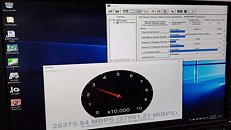Wednesday, September 27th 2017

Eight NVMe Drives RAIDed on AMD X399 Break the 28 GB/s Barrier
When AMD launched its Ryzen Threadripper HEDT platform, they forgot one crucial feature - NVMe RAID support. They realized their fault and promised a BIOS and driver update on September 25 that would allow users to boot from a NVMe RAID. Der8auer, overclocker extraordinaire, got first dibs on the BIOS update and uploaded a Youtube video to show us the performance numbers from a RAID array of eight NVMe SSDs. Unfortunately, he took down the video, but not before HardOCP could grab some screenshots of his feat.
As we can see from the screenshots, Der8auer created his RAID array on an ASUS X399 motherboard. Since the UEFI interface has ROG markings all over it, he probably used a ROG Zenith Extreme. With the help of two ASUS Hyper M.2 X16 cards, Der8auer was able to install his eight Samsung 960 PRO/EVO SSDs. Although we cannot distinguish the model clearly, the performance is simply spectacular. IOmeter measured a transfer speed of 28375.84 MB/s.
Source:
HardOCP
As we can see from the screenshots, Der8auer created his RAID array on an ASUS X399 motherboard. Since the UEFI interface has ROG markings all over it, he probably used a ROG Zenith Extreme. With the help of two ASUS Hyper M.2 X16 cards, Der8auer was able to install his eight Samsung 960 PRO/EVO SSDs. Although we cannot distinguish the model clearly, the performance is simply spectacular. IOmeter measured a transfer speed of 28375.84 MB/s.



22 Comments on Eight NVMe Drives RAIDed on AMD X399 Break the 28 GB/s Barrier
Also just out of curiosity does anyone know if he could have plugged 3 of those drives into the motherboard m.2 slots and maintained similar performance, or does the motherboard m.2 drive slots have reduced performance in comparison to one of these riser slot card things?
One of the things that was needed is the ability to bifurcate the PCIe slots.
The ASUS M.2 expander card needs to be set in the BIOS to 4x/4x/4x/4x.
I believe he mentioned ASUS is currently the only one that has it, but thinks that competitors will be adding this in future BIOS update.
Not sure on the slots...
But can you boot from this setup?
And this clearly supports more nvme performance than intel and you can boot from it and do raid without a $$$ hardware dongle. WTF are you smoking.
I have a R7 1700 @ 3.9ghz... I play games at 4k, so it doesn't hurt me there... and when I flip on a few vms or stream my gameplay I don't lose FPS.
It relies on platform's bifurcation of one x16 lane into four x4.
No such thing exists on mainstream, and you'd get (with much optimism) at most 3 running ssds (115x) or 2 (am4).
It will probably require manual configuration on bios side (as seen on screencap) - most motherboards provide none.
This ASUS's Hyper card which is not yet sold (reason the video was pulled down), is it working without any issues on the Intel's Z370 or future Z390 platform with all 4 M2 SSDs RAID enabled and boot capable?
I am very very interested in purchasing this card together with 4xM2 SSDs for my next build.
Also what is the RAID version of it, any ideeas?